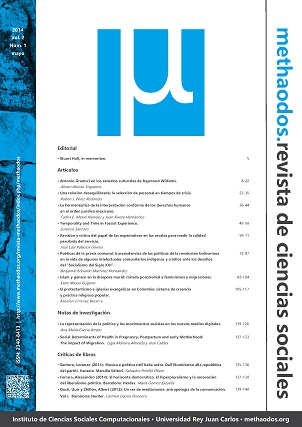Social Determinants of Health in Pregnancy, Postpartum and early Motherhood: the impact of Migration
Main Article Content
Resumo
The present investigation sought to establish itself as an interface between Public Health and Social Medicine. Its main purpose relied in assessing theoretical inequalities in access, utilization and quality of maternal health care in immigrant recent mothers and its interaction with social determinants of health. The underlying research plan was designed to explore specific clinical, individual and social determinants in maternal health (during pregnancy and postpartum). Another specific goal is the assessment of access, utilization and quality of the received care (adequacy and satisfaction of responses offered by the public health system), establishing a comparison between health status, perceptions and needs of immigrant and native women in the same conditions and motherhood stages. Data was collected in all reference hospitals and several civilian associations of Porto metropolitan area, to better reach the targeted population: recent immigrant mothers from the countries with the highest representation in Portugal at the date (Brazil, African countries of Portuguese speaking and Eastern European countries), as well as Portuguese women (for comparison). To accomplish the defined objectives, three studies were performed using data obtained in all defined backgrounds, following different methodological approaches and designs (qualitative and quantitative strategies).
Downloads
Article Details
Referências
Almeida, L. M., Caldas, J., Ayres-de-Campos, D., Salcedo-Barrientos, D. y Dias, S. (2013a): “Maternal healthcare in migrants: a systematic review”, Matern Child Health J., 17 (8): 1346-1354. http://dx.doi.org/10.1007/s10995-012-1149-x
Almeida, L. M., Casanova, C., Caldas, J., Ayres-de-Campos, D. y Dias, S. (2013b): “Migrant Women's Perceptions of Healthcare During Pregnancy and Early Motherhood: Addressing the Social Determinants of Health”, J Immigr Minor Health. [Epub ahead of print]. http://dx.doi.org/10.1007/s10903-013-9834-4
Almeida, L. M., Caldas, J. P., Ayres-de-Campos, D. y Dias, S. (2014a): “Assessing maternal healthcare inequities among migrants: a qualitative study”, Cad Saude Publica, 30 (2): 333-340.
Almeida, L. M., Santos, C. C., Caldas, J. P., Ayres-de-Campos, D. y Dias, S. (2014b): “Obstetric care in a migrant population with free access to health care”, Int J Gynecol Obstet. Available online. [4 May 2014]. http://dx.doi.org/10.1016/j.ijgo.2014.03.023
Bhopal, R. S. (2007): Ethnicity, Race and Health in Multicultural Societies. New York: Oxford University Press. http://dx.doi.org/10.1093/acprof:oso/9780198568179.001.0001
Bunevicius, R., Kusminskas, L., Bunevicius, A., Nadisauskiene, R., Jureniene, K. y Pop, V. (2009): “Psychosocial risk factors for depression during pregnancy”, Acta Obstet Gynecol Scand, 88: 599-605. http://dx.doi.org/10.1080/00016340902846049
Caldas, J. (2007): Inmigración y salud: un nuevo reto para las políticas de salud pública. Buenos Aires: VII Jornadas de Sociología de la UBA: Pasado, presente y futuro de la sociología.
Canavarro, M. (2001): Psicologia da Gravidez e da Maternidade. Coimbra: Quarteto Editores.
Carballo, M. (2009a): “Communicable Diseases”, in: Health and Migration in the European Union: Better Health for All in an Inclusive Society. Lisboa: Instituto Nacional de Saúde Doutor Ricardo Jorge.
— (2009b): “Non-communicable Diseases”, in: Health and Migration in the European Union: Better Health for All in an Inclusive Society. Lisboa: Instituto Nacional de Saúde Doutor Ricardo Jorge.
Dias, S. y Rocha, C. (2009): Saúde Sexual e Reprodutiva de Mulheres Imigrantes Africanas e Brasileiras. Lisboa: Observatório da Imigração.
Fonseca, M., Silva, S., Esteves, A. y McGarrigle, J. (2009): MIGHEALTHNET - Relatório sobre o Estado da Arte em Portugal. Lisboa: Universidade de Lisboa.
Gushulak, B., Pace, P. y Weekers, J. (2010). “Migration and health of migrants”, in: Poverty and social exclusion in the WHO European Region: health systems respond. Copenhagen: WHO.
Ingleby, D., Chimienti, M., Hatziprokopiou, P. y Freitas, C. (2005): The role of health in integration. Lisboa: Centro de Estudos Geográficos.
Ingleby, D. (2012): “Ethnicity, Migration and the "Social Determinants of Health" Agenda”, Psychosocial Intervention, 21 (3): 331-341. http://dx.doi.org/10.5093/in2012a29
IOM-International Organization for Migration (2011): World Migration Report 2011: Communicating effectively about migration. Geneva: International Organization for Migration.
Loureiro, I. y Miranda, N. (2011): Promover a Saúde - Dos Fundamentos à Acção. Lisboa: Edições Almedina.
Martins, I., Faria, A. y Lage, G. (2010): Diversidade Cultural Urbana. Porto: Câmara Municipal do Porto.
Padilla, B. y Miguel, J. (2009): “Health and migration in the European Union: Building a shared vision for action”, in: Health and Migration in the European Union: Better Health for All in an Inclusive Society. Lisboa: Instituto Nacional de Saúde Doutor Ricardo Jorge.
Rechel, B., Mladovsky, P., Ingleby, D., Mackenbach, J. P. y McKee, M. (2013): “Migration and health in an increasingly diverse Europe”, Lancet, 381: 1235-1245. http://dx.doi.org/10.1016/S0140-6736(12)62086-8
Rumbold, A., Bailie, R., Si, D., Dowden, M., Kennedy, C., Cox, R., et al. (2011): “Delivery of maternal health care in Indigenous primary care services: baseline data for an ongoing quality improvement initiative”, BMC Pregnancy Childbirth, 11 (16). Available online. http://dx.doi.org/10.1186/1471-2393-11-16
Urquia, M., O'Campo, P. y Heaman, M. (2012): “Revisiting the immigrant paradox in reproductive health: The roles of duration of residence and ethnicity”, Soc Sci Med, 74: 1610-1621. http://dx.doi.org/10.1016/j.socscimed.2012.02.013

